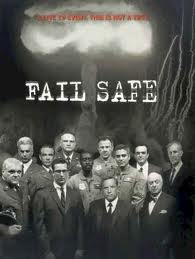
FAILSAFE
US, 2000, minutes, black and white.
Richard Dreyfus, Brian Dennehy, George Clooney, Hank Asazria, Don Cheadle, John Diehl, James Cromwell, Noah Wyle, Sam Elliot, Norman Lloyd, Bill Smitrovich, Grant Heslov.
Directed by Stephen Frears.
Failsafe was a popular novel of the 1960s, written by Eugene Burdick and Harvey Wheeler. It was made into a very successful film during the nuclear fear years of the early 1960s, stirring Henry Fonda as the American President faced with a potentially catastrophic situation with a plane with a nuclear warhead travelling towards Moscow. There are issues of mutual trust and distrust in the Cold War atmosphere, the influence of hawks and doves, the variety of experts, the military advisers, the translators between the two presidents – and the American President having to promise that he will drop a nuclear bomb on New York City to show that the attack on Moscow was unintentional.
At the same time, similar themes were explored seriously in Seven Days in May and satirically in Dr Strangelove.
Almost 50 years later, it still makes for suspenseful drama. This time the President is played by Richard Dreyfus, pilots by George Clooney and Don Cheadle, military advisers by John Diehl and James Cromwell with Brian Dennehy in charge of operations.
What makes this film distinctive is that it was filmed in the studio, in continuity, and in real time. Some lighting and equipment from earlier times was used.
The film, looking like Playhouse 90 and other television dramas of the 1950s, was directed by the British Stephen Frears, an expert at many types of genres.
1. The impact of the novel in the 1960s? The nuclear fears and episodes of the early 1960s? The missiles of October? The impact of the film in the 1960s?
2. The style of production, and live performance, the actors, the sets, photography, the various angles, television editing? The musical score?
3. The strong cast, the career of the director?
4. The impact for 2000, 21st century, nuclear issues? Strong drama?
5. The recreation of the realities of the 1960s, nuclear capacities of the US and the double SR, the role of the president’s? Books and doves? Advisers?
6. The nuclear silos, underground, the plants, the offices, the control centres? The initial tool, the questions and secrecy, members of industry and
supplying parts for the nuclear arsenal? The technical aspects? The politician on the two? The political questions and answers?
7. The explanations for the visitors, as explanations for the audiences about the nuclear situation and capacity? The role of Russia? Surveillance? Spying?
8. The technical aspects, the small mishaps, the ability to correct, the possibilities for technical mishaps not to be detected and have strong consequences?
9. Brian Dennehy, his role, in charge, genial personality, the guide, his explanations, his growing interest and concern? John Diehl as his support officer, strong member of the staff, the importance of loyalty? His of patriotism, obeying orders even when not understood? The testing of loyalties?
10. The care squad ready, the pilots, their personalities, interactions, the ordinary lives, an ordinary day? Being on the ready, the role of orders, the top security? Even two overriding phone calls from the President? The exercise of leadership, in the air, the puzzle, suppressing questions of authority? The shooting down of the planes, their persevering?
11. The Pentagon, the meetings, the members at the meetings, the discussions, the possibilities?
12. Harvey Keitel, the opening with him, ordinary life, at home, his wife and family, going to work, at the meetings, his contributions, more dove-like and critical of the right-wing views? The president relying on him? Contributions to the developments, being ordered into action?
13. The academic expert, hawkish approach, presumptions, about the role of the United States, taking advantage of this, economic and political, anti-Russia? His speech, advice, caught up in the crisis, listening, his addressing the group?
14. The malfunction, the effect, the inability to correct it, the evidence of the malfunction, the watching of the screens, the disbelief at the plans and their mission?
15. The role of the president, his character, the translator helping him, the president confiding in him? The difficulties of the phone calls, the diplomatic style, talking to the Russians, to the President, being patched through to the Pentagon and the other groups? His seeking advice? The responsibility totally on him? Trust? The Russian President, wary, the same situation in Russia? Checking out whether the information was correct, testing, the President withdrawing from Moscow?
16. Brian Dennehy, in his official role, his having to obey orders, the shooting down of the American planes, deal and his inability to issue the command? His being relieved? The next officer and his obeying?
17. The planes flying to Moscow, the attacks on the plans, the Russians trying to shoot them down, the Americans’ offer to shoot the American planes down? John Diehl and his fear of it being a trick, mistrusting the Russians? Watching on the screens and the dots going further towards Moscow?
18. The order for the bombing of New York, Keitel and his mission, the scenes of his wife and child at Radio City Music Hall, the number of people, millions, to be destroyed?
19. The screenplay providing aspect on all the issues, nuclear buildup, spying, secrecy, sharing secrets, distrust, the role of authorities? The final with the ambassador and the Consul in New York and Moscow, staying at their posts, the phone calls and their deaths?
20. The film and its message, possibilities for destruction, human error, machines and the consequences? The need for peace, diplomacy and trust?